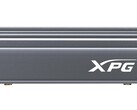PCIe 4.0 might be a short-lived standard, but until the 5.0 version hits the market some time in late 2020 at the soonest, NVMe SSD makers and, who knows, maybe even GPU makers (hint hint Nvidia!) will at least try to launch improved models supporting the 4.0 tech. With the introduction of AMD’s X570 chipset for the 7 nm Ryzen 3000 CPUs last year, support for the PCIe 4.0 standard was made available for consumers, but not too many SSD makers hurried to offer updated versions. We have seen PCIe 4.0 SSDs delivering read and write speeds in excess of 5,000 MB/s, yet it looks like there is room for improvement still, as Adata just showcased its latest XPD Sage model that can reach speeds of over 7,000 MB/s at CES.
Adata’s newest PCIe Gen 4 models come equipped with an Innogrit Rainier (IG5236) controller, which offers quite a substantial performance jump over the current Phison E16 that powers the 5,000 MB/s models. Apart from 7,000+ MB/s sequential reads and 5,300+ MB/s sequential writes, the IG5236 controller is also the first to break 1 million read IOPs, and the 800,000 write IOPs are not too shabby either. The CrystalDisk benchmark showcased at CES reported 7,240.7 MB/s sequential read speeds and 5,395.5 MB/s sequential write speeds.
All this outstanding performance is achieved using the older 16 / 12 nm manufacturing process from TSMC, so SSDs are not quite up to date when it comes to the 7 nm craze. The IG5236 supports capacities up to 16 TB, but Adata will only offer a maximum of 4 TB, most likely in order to keep production costs and retail prices at reasonable levels. The new SSD models will feature 4 GB DRAM cache and an efficient heatspreader, but this one was not presented at CES.
Price points have not yet been revealed, however, Adata expects an official mid-year release.
Loading Comments
I first stepped into the wondrous IT&C world when I was around seven years old. I was instantly fascinated by computerized graphics, whether they were from games or 3D applications like 3D Max. I'm also an avid reader of science fiction, an astrophysics aficionado, and a crypto geek. I started writing PC-related articles for Softpedia and a few blogs back in 2006. I joined the Notebookcheck team in the summer of 2017 and am currently a senior tech writer mostly covering processor, GPU, and laptop news.
> Expert Reviews and News on Laptops, Smartphones and Tech Innovations > News > News Archive > Newsarchive 2020 01 > Adata reveals PCIe 4.0 XPG Sage NVMe SSD with 1 million IOPs and 7,000 MB/s speeds
Bogdan Solca, 2020-01- 8 (Update: 2020-01- 8)























